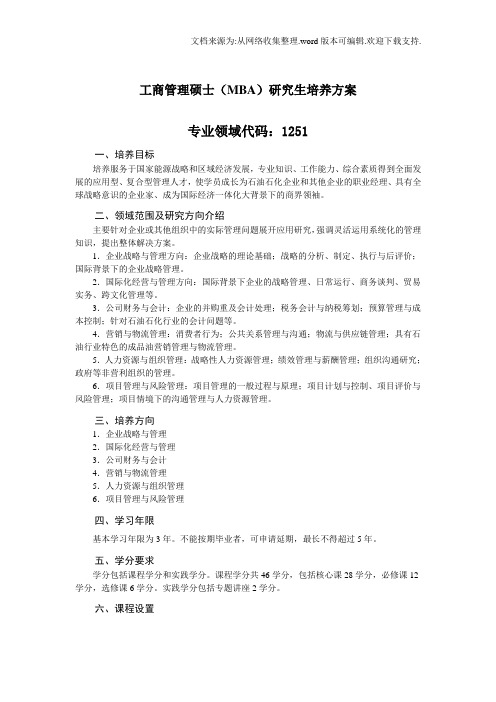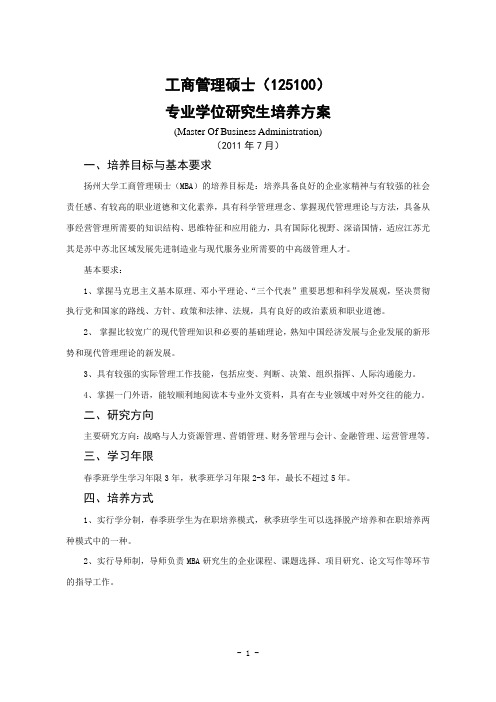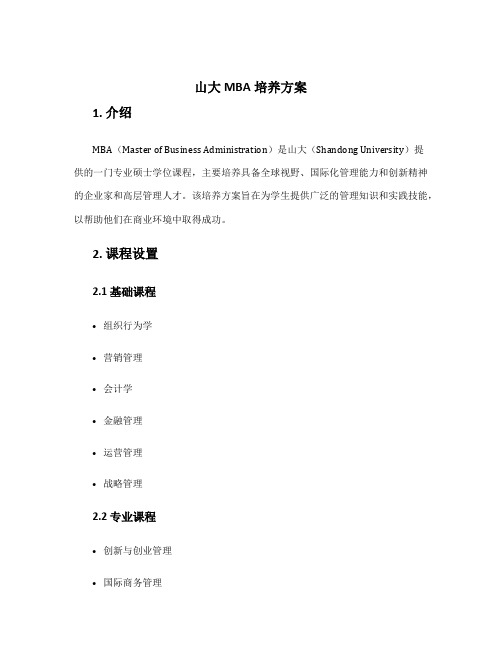上海财经大学商学院新版MBA培养方案出台-MBA考试.doc
工商管理硕士MBA研究生培养方案

工商管理硕士(MBA)研究生培养方案专业领域代码:1251一、培养目标培养服务于国家能源战略和区域经济发展,专业知识、工作能力、综合素质得到全面发展的应用型、复合型管理人才,使学员成长为石油石化企业和其他企业的职业经理、具有全球战略意识的企业家、成为国际经济一体化大背景下的商界领袖。
二、领域范围及研究方向介绍主要针对企业或其他组织中的实际管理问题展开应用研究,强调灵活运用系统化的管理知识,提出整体解决方案。
1.企业战略与管理方向:企业战略的理论基础;战略的分析、制定、执行与后评价;国际背景下的企业战略管理。
2.国际化经营与管理方向:国际背景下企业的战略管理、日常运行、商务谈判、贸易实务、跨文化管理等。
3.公司财务与会计:企业的并购重及会计处理;税务会计与纳税筹划;预算管理与成本控制;针对石油石化行业的会计问题等。
4.营销与物流管理:消费者行为;公共关系管理与沟通;物流与供应链管理;具有石油行业特色的成品油营销管理与物流管理。
5.人力资源与组织管理:战略性人力资源管理;绩效管理与薪酬管理;组织沟通研究;政府等非营利组织的管理。
6.项目管理与风险管理:项目管理的一般过程与原理;项目计划与控制、项目评价与风险管理;项目情境下的沟通管理与人力资源管理。
三、培养方向1.企业战略与管理2.国际化经营与管理3.公司财务与会计4.营销与物流管理5.人力资源与组织管理6.项目管理与风险管理四、学习年限基本学习年限为3年。
不能按期毕业者,可申请延期,最长不得超过5年。
五、学分要求学分包括课程学分和实践学分。
课程学分共46学分,包括核心课28学分,必修课12学分,选修课6学分。
实践学分包括专题讲座2学分。
六、课程设置七、专题讲座举办专题讲座是为了让MBA学员了解本学科各研究方向的理论前沿和实践动态,以拓宽学员视野,优化知识结构。
专题讲座由来自企业界、学术界、政界和文化界的专家主讲。
学员3年至少要参与10次专题讲座。
本环节通过后计2个实践学分。
MBA培养方案(迎评终版)

工商管理硕士(125100)专业学位研究生培养方案(Master Of Business Administration)(2011年7月)一、培养目标与基本要求扬州大学工商管理硕士(MBA)的培养目标是:培养具备良好的企业家精神与有较强的社会责任感、有较高的职业道德和文化素养,具有科学管理理念、掌握现代管理理论与方法,具备从事经营管理所需要的知识结构、思维特征和应用能力,具有国际化视野、深谙国情,适应江苏尤其是苏中苏北区域发展先进制造业与现代服务业所需要的中高级管理人才。
基本要求:1、掌握马克思主义基本原理、邓小平理论、“三个代表”重要思想和科学发展观,坚决贯彻执行党和国家的路线、方针、政策和法律、法规,具有良好的政治素质和职业道德。
2、掌握比较宽广的现代管理知识和必要的基础理论,熟知中国经济发展与企业发展的新形势和现代管理理论的新发展。
3、具有较强的实际管理工作技能,包括应变、判断、决策、组织指挥、人际沟通能力。
4、掌握一门外语,能较顺利地阅读本专业外文资料,具有在专业领域中对外交往的能力。
二、研究方向主要研究方向:战略与人力资源管理、营销管理、财务管理与会计、金融管理、运营管理等。
三、学习年限春季班学生学习年限3年,秋季班学习年限2-3年,最长不超过5年。
四、培养方式1、实行学分制,春季班学生为在职培养模式,秋季班学生可以选择脱产培养和在职培养两种模式中的一种。
2、实行导师制,导师负责MBA研究生的企业课程、课题选择、项目研究、论文写作等环节的指导工作。
五、课程设置与学分分配课程设置分为学位课、非学位课和实践环节三类。
详见下表:工商管理硕士(MBA)课程设置及学分分配关于工商管理硕士(MBA)课程设置及学分分配的说明:1、学位课共34学分。
其中,公共课程6学分,MBA核心课程28学分。
2、非学位课共12学分。
其中,公共课程4学分,为必修学分;方向选修课8学分,学生可在开放的课程内自主选择课程。
工商管理硕士MBA研究生培养方案

工商管理硕士(MBA)研究生培养方案(适用于春季班)华北电力大学研究生院二○一三年四月2013春季工商管理硕士(MBA)培养方案一、培养目标工商管理硕士(MBA)注重复合型、综合型人才培养,传授的是面对实战的“管理知识和管理经验”。
MBA培养目标是:1、热爱社会主义祖国,遵纪守法,品德良好,具有良好的团结合作精神,积极为社会主义现代化建设事业服务。
2.掌握较为广博的现代管理知识,熟悉所从事工作的领域中科学技术的发展动向,有较强的决策、组织和领导能力。
3.熟练地掌握一门外语,能顺利地阅读、翻译本专业外文文献,具有较强的商务谈判能力,能胜任工商管理、电力企业管理等相关涉外业务,并对从事的行业具有全面深入的了解。
4.身心健康,精神饱满,能胜任繁重的管理工作。
二、专业方向1、电力企业管理2、项目管理3、人力资源管理4、财务与金融5、市场营销6、现代物流管理三、培养方式及学习年限1、培养方式(1)攻读工商管理硕士(MBA)的培养方式为导师负责制,课程学习和科学研究可以相互交叉进行。
(2)成立导师组,发挥集体培养的作用。
导师组应以具有指导硕士研究生资格的正、副教授为主,并吸收各经济产业部门与企业中具有高级专业技术职务的管理人员参加。
(3)采用案例教学等互动式教学方法,授课内容要少而精,且理论联系实际,注重培养学生的创新能力和实际管理能力。
(4)积极开辟第二课堂,通过企业家论坛和学术讲座等形式,聘请有丰富实践经验的企业家和有关学科专家教授到校演讲或开设讲座。
实习可按照学员的实际情况采取多种形式,可以深入调查研究企业的经营管理经验与问题,也可以采用案例编写与分析和实习相结合的形式,充分运用调查研究、企业咨询等方式,促使MBA研究生深入企业,联系实际,总结经验,提升竞争力。
2、学习年限学习年限实行以2.5年制为基础的弹性学制,学习年限不超过5年,其中,论文工作时间不少于九个月。
四、课程设置及学分要求1、课程设置根据全国工商管理硕士(MBA)教育指导委员会《关于MBA研究生培养过程的若干基本要求》,并结合电力行业MBA教育的实际情况,我校MBA项目修读的课程分为必修课程(基础理论课和专业必修课)和选修课程。
mba《培养方案解读》总结报告

mba《培养方案解读》总结报告标题:MBA《培养方案解读》总结报告一、培养目标本MBA培养方案旨在培养具备高度商业洞察力、创新思维和国际化视野的高级管理人才。
通过本方案的学习,学生将能够全面掌握现代企业管理知识,提高解决实际问题的能力,并具备领导企业实现战略目标的能力。
二、课程设置本培养方案共分为四个模块:管理基础、商业洞察、创新思维和国际化视野。
管理基础模块涵盖了组织行为学、管理经济学、会计学等基础知识;商业洞察模块注重培养学生的市场分析能力、企业战略规划能力;创新思维模块则强调创新思维、创新方法和创新实践等方面的能力培养;国际化视野模块则突出全球化的趋势,培养学生的跨文化交流和国际化经营能力。
三、教学方法本培养方案采用多种教学方法,包括讲座、案例分析、团队讨论、角色扮演等。
通过这些方法,学生将能够更好地理解理论知识,同时提高解决实际问题的能力。
此外,我们还采用了现代化的教学技术,如在线课程、多媒体教学等,以提升学生的学习体验和效果。
四、实践教学本培养方案注重实践教学,通过企业参观、实习、实践项目等方式,让学生更好地了解企业实际运营情况,并提高解决实际问题的能力。
同时,我们还与多家知名企业合作,开展校企合作项目,为学生提供更多的实践机会和职业发展资源。
五、职业发展本培养方案的毕业生将具备高度的商业洞察力、创新思维和国际化视野,符合企业对高级管理人才的需求。
我们将提供完善的职业发展服务,包括就业指导、职业规划、人才推荐等,为毕业生提供更多的职业发展机会。
六、总结本MBA培养方案注重理论知识和实践能力的结合,通过多种教学方法和实践教学手段,培养学生的商业洞察力、创新思维和国际化视野。
我们将继续努力完善培养方案,提高教学质量,为更多的学生提供优质的教育资源和服务。
上海财经大学2012年国际MBA项目招生简章

上海财经大学2012年国际MBA项目招生简章培养目标通过严格规范的系统教育,培养面向未来国际商务活动的领导者,培养具有良好的商业道德,较强的决策和创新能力,熟知国际经济、技术的发展趋势,善于把握国内经济、技术发展的最新动态,积极参与国际竞争的优秀卓越的管理者。
项目优势1、教学质量:通过三大制度保障教学质量2、办学历史:是最早获中国教育部批准授予境外MBA学位项目之一自1996年以来,已连续招生十五年3、社会认可度:荣获上海市教学成果一等奖国家优秀教学成果二等奖报名与录取1、报名条件:具有学士学位或大学本科毕业学历具有三年以上工作经验2、录取程序:* 凡在2009年后参加TOEFL考试且成绩在575分以上者,或GMAT考试成绩在600分以上者,可免英语笔试。
3、报名地点报名地点:上海市中山北一路369号上海财经大学咨询电话:(86-21)6536 2986传真号码:(86-21)6536 1956相关网站:学制、学习方式、学位与学费1、学制:一般为二年(每年五个学期,每学期九周),最长四年;2、学习方式:在职不脱产学习,周末上课;3、学位:经中国教育部批准授予韦伯斯特大学工商管理硕士(MBA)学位;4、学费:学位课-人民币148000元(分两年支付)预修课-人民币8000元上课地点课程简介BUSN 5000 - BusinessCourse DescriptionThis course is designed to provide a foundation in such general business concepts as economics, finance, accounting, business law, marketing, and other business systems.The purpose of the course is to introduce students to the language of business and provide a minimal background in all the areas that comprise business. The course will also introduce many of the fundamental concepts and theories that are central to understanding the operation of businesses. The focus of the course will be on application of these concepts and theories in a real world setting.Course ObjectivesThe goal of this course is to prepare non-business graduates with enough understanding of the language and theory of business to allow the successful completion of the MBA program.PrerequisitesNone.BUSN 5620 - Current Economic AnalysisCatalog DescriptionImplications of current economic events are examined through the applications of economic theory. Emphasis is placed on acquainting the student with the methods of economic analysis in the context of current economic issues. PrerequisitesNone.BUSN 5600 - Accounting Theory and PracticeCourse DescriptionStudents examine the accounting function and its role in modern business. Basic accounting theory and principles are examined, and some of the more important contemporary accounting developments are reviewed. Case studies are analyzed with an emphasis on situations from the student's own work experiences. This course is designed for consumers as opposed to producers of accounting.Students will be given the opportunity to learn the language of business (Accounting) and the concepts, technical rules of generally accepted accounting principles, and the application of these rules to the business environment. The course provides the coverage of generally accepted accounting principles in relationship to liabilities; owners equity; revenue recognition; accounting changes; financial statement analysis and other related topics.Course ObjectivesThe goal of this course is to provide not only the accounting knowledge based on generally accepted accounting principles, but also the critical thinking skills necessary to analyze and interpret accounting related transactions in accordance with generally accepted accounting principles, and the reports generated by the accounting system.PrerequisitesNone.BUSN 6080 - Business Information SystemsCourse DescriptionThe student examines information systems in business organizations. This course will develop the framework for an information system and explore how systems that support the business functions of the organization are integrated and aid the manager with decision making responsibilities within theoperational, tactical, and strategic hierarchy of the company. Underlying the examination of various organizational information systems will be an exploration of emerging technologies that drive these systems. This course provides the student with the skills necessary to effectively understand and use information technology and shows how information technology provides organizations with a strategic competitive advantage.Course ObjectivesThis course in Business Information Systems examines technology through the eyes of the manager and is designed with the purpose of meeting several broad objectives:·To capture the essence of contemporary computer use in business as an organizational information system.·To emphasize current issues in computing and information technology use.·To understand systems theory and those methodologies which provide a framework for the entire field of business computing.·To gain a broader foundation in technology by examining the computer as a problem solving tool.·To provide an overview of computer-based information systems by describing the major business functions and application areas.·To understand the organizational management information system and describe how the MIS concept is applied to subsets of the organization. PrerequisitesNone.MRKT 5000 - MarketingCatalog DescriptionStudents examine the character and importance of the marketing Process, its essential functions, and the institutions exercising these functions. Course content focuses on the major policies that underlie the activities of marketing institutions and the social, economic, and political implications of such policies. This course gives an overview of the entire marketing process and the integration of the elements that make up a Marketing Plan.PrerequisitesNone.BUSN 5760 - Applied Business StatisticsCourse DescriptionThis course is designed for MA/MBA students and will cover descriptive statistics, probability and random variables, sampling and statistical inference, techniques of statistical analysis, and business forecasting techniques. Course Objectives1. To help students acquire a knowledge of statistical tools used foradvanced statistical analyses of business data.2. To help students apply the most efficient means to analyze data as itmight be presented in a variety of real life business situations. PrerequisitesNone.FINC 5000 - FinanceCourse DescriptionThe student examines the general nature of financial management, the American financial system, taxes, and the major financial decisions of corporations. Specific attention is given to present value and capital budgeting; risk and asset pricing; financial analysis and forecasting; financial decisions and market efficiency; and capital structure. Problem-solving methodology is used to illustrate the theories and tools in financial decision making.Course ObjectivesThe course is introductory in nature with the following objectives: ·Familiarity with the Cash Flow Cycle·Command of the Time Value of Money concepts·Ability to calculate the cost of various forms of capital·Introduction to the Optimal Capital Structure·Cash Flow Budgeting·Capital BudgetingPrerequisitesBUSN 5600 and BUSN 5760. It is assumed the student has adequate writing, mathematical, and analytical skills. Also, as for all internet courses, the student must be disciplined and self-motivated.FINC 5880 - Advanced Corporate FinanceCourse DescriptionThis advanced study of corporate financial analysis and planning includes capital budgeting, cost of funds, and capital structure and valuation. Selected topics that may be covered are leasing, mergers, takeovers, business failure, reorganization, and liquidation. A combination of problem-solving andcase-study methodologies is used to illustrate theories and techniques helpful in financial analysis and planning.Course ObjectivesThis course examines advanced financial concepts and is designed to meet the following objectives:·To acquire knowledge of broad financial concepts·To enhance skills in obtaining information on current financial issues ·To apply knowledge to specific problems and cases·To conduct cash flow and capital budgeting analysis·To uate working capital management concepts and techniques·To gain an understanding of hybrid financing·To become aware of international issues in finance·To uate special areas, including bankruptcy and mergers. PrerequisitesFINC 5000.BUSN 6120 - Managerial EconomicsCourse DescriptionThe student examines the application of microeconomic theory as applied to the managers' responsibilities within the organization. This course should emphasize the quantitative and qualitative application of economic principles to business analysis.Course ObjectivesBUSN 6120 lays the foundation of industry analysis to be applied in BUSN 6200. The student will develop the following competencies:·Familiarity with quantitative market analysis·Understanding of price elasticity and pricing strategy ·Understanding of market structure and the implication for strategy and profitabilityPrerequisitesBUSN 5620 and BUSN 5760. It is assumed the student has adequate writing, mathematical, and analytical skills. Also, as for all internet courses, the student must be disciplined and self-motivated.BUSN 6070 - Management AccountingCourse DescriptionThe student examines advanced topics in management accounting as these relate to management information needs for planning, control, and decision making. Topics include interpretation of standard cost variances; application of quantitative techniques; uation of divisional performance; activity-based costing; and the behavioral impact of accounting systems.Course ObjectivesThe objective this course is not to turn you into professional accountants, although by the end of the course you will be able to use many management accounting techniques in the analysis of business problems. Rather, the primary objective is to enable you to make effective use of management accounting information within your own organization or your business practice.A secondary objective is to develop the analytical skills necessary to diagnose complex business problems in an accounting information context. We will study how accounting information can be used intelligently to make managerial decisions in a global business environment. The main focus is on the use of accounting information, although we shall spend some time on its preparation.The world of accounting is dynamic, and we will combine the study of traditional concepts and techniques with that of the most recent advances in management accounting. Learning objectives are the benchmarks that determine whether the student has successfully understood the course material. There are six specific goals, each of which is integrated and covered throughout the course:1. Understand the "big picture" fundamentals of management accounting.2. Understand the role management accounting plays in supportingorganizations and managers in keeping pace with technological change, globalization, and customer needs.3. Understand how the manager uses the accounting system to acquireinformation for making planning decisions.4. Understand how the accounting system measures the performance andinfluences the behavior of the manager.5. Understand the strengths and weaknesses of an organizationsaccounting information system.6. Use management accounting methods and information to achievecustomer and organizational value through sound business decisionmaking.PrerequisitesBUSN 5600 - Accounting Theory and Practice and BUSN 5760 - Applied Business Statistics.MNGT 5590 - Organizational BehaviorCatalog DescriptionThis course introduces students to many of the basic principles of human behavior that effective managers use when managing individuals and groups in organizations. These include theories relating to individual differences in abilities and attitudes, attribution, motivation, group dynamics, power and politics, leadership, conflict resolution, organizational culture, and organizational structure and design.Course Level Learning OutcomesUpon successful completion of this course, the student will be able to:·Define, discuss, and recognize important terminology, facts, concepts, principles, analytic techniques, and theories taught in this organizational behavior course.·Identify and apply appropriate terminology, facts, concepts, principles, analytic techniques, and theories from the organizational behavior course when analyzing factual situations with organizational behavior problems. ·Develop reasonable solutions to organizational behavior problems using appropriate facts, concepts, principles, analytic techniques, and theories from this organizational behavior course.·Evaluate the quality of their proposed solutions to organizational behavior problems against appropriate criteria, including organizational constraints.·Discuss the relevance and application of the concepts, principles, and theories used in organizational behavior to contemporary events.·Identify and discuss the interrelationships among the concepts, principles, and theories used in the different areas of organizational behavior. PrerequisitesNone.BUSN 6110 - Operations and Project ManagementCourse DescriptionThis is a course that focuses on the major managerial issues in manufacturing management and the tools that can be used to manage them. Special attention will be given to project management, including PERT, critical path scheduling, and time-cost models, in operations management and other business settings. The major operations management issues are quality management and control, capacity management, plant location, layout and design, production planning and scheduling, supply chain management and inventory management. The analytical tools covered include queuing theory, statistical quality control, linear programming, and learning curves. Where appropriate the use of operations management techniques in service and distribution organizations will be demonstrated.Course Objectives·Familiarize the student with modern production management theory. ·Provide the student with a working understanding of current production management and quality control applications.·Introduce the student to future trends in manufacturing and the influence and effect of world class production philosophies on American industries.PrerequisitesBUSN 5760 - Applied Business Statistics. It is assumed the student has adequate writing, mathematical, and analytical skills. Also, as for all internet courses, the student must be disciplined and self-motivated.BUSN 6200 - Strategy and CompetitionCourse DescriptionThe student examines the conceptual and practical aspects of business policies and policy decision making by utilizing all the concepts, theories, and tools that were presented in the previous courses. The student should be able to analyze and recommend a comprehensive and workable approach to the situation. The course should cover current business issues and developments. Course ObjectivesThere are seven course statements of objectives for this course. They are as follows:1. This course will give the students experience in applying strategicmanagement concepts and techniques that apply to differentorganizations.2. Students will be expected to apply and integrate the knowledge gainedin prior courses and his/her work experience.3. This course will allow the students to engage in decision-makingexperiences in real world organizations principally through case studies.4. This course will improve the student's understanding of relationshipsamong the functional areas of business and strategic managementprocesses.5. This course will improve the student's written communication skills.6. Upon completion of this course the student should have sharpenedhis/her analytical and intuitive skills.7. This course will give the students multi-media experience bycommunicating with other students at various Webster's campusesthroughout the world.PrerequisitesCompletion of all other required courses in the M.B.A. . It is assumed the student has adequate writing, mathematical, and analytical skills. Also, as for all internet courses, the student must be disciplined and self-motivated. NOTE: This course uses Capstone Business Simulation software. If you have a Mac you need to be running Mac OS 10 or higher to use the simulation software. PC users should be fine.。
山大mba培养方案

山大MBA培养方案1. 介绍MBA(Master of Business Administration)是山大(Shandong University)提供的一门专业硕士学位课程,主要培养具备全球视野、国际化管理能力和创新精神的企业家和高层管理人才。
该培养方案旨在为学生提供广泛的管理知识和实践技能,以帮助他们在商业环境中取得成功。
2. 课程设置2.1 基础课程•组织行为学•营销管理•会计学•金融管理•运营管理•战略管理2.2 专业课程•创新与创业管理•国际商务管理•项目管理•数据分析与决策•领导力与团队管理•人力资源管理2.3 选修课程学生可以根据自己的兴趣和职业发展目标选择以下选修课程之一:•供应链管理•创新营销•企业战略与竞争力•国际金融•风险管理•商务智能与大数据分析3. 实践环节3.1 实习学生需要在MBA课程期间完成至少一段实习,以将所学的理论知识应用到实际商业环境中。
学校与许多知名企业和组织合作,为学生提供实习机会。
3.2 企业访问学生将有机会参观各类企业,并与企业高层管理人员交流。
这将为学生提供了解不同行业和企业运营模式的机会,拓宽他们的商业视野。
3.3 商业项目学生将参与一些真实的商业项目,旨在培养他们解决实际商业问题的能力和创新思维。
这些项目将由学校与企业合作,学生将与企业人员一起工作,提出解决方案并实施。
4. 学术研究学生在MBA课程期间将开展一项独立的学术研究项目。
他们将选择一个感兴趣的管理领域,并进行深入研究,撰写一篇学术论文。
学校将为学生提供必要的指导和支持,以确保他们顺利完成研究项目。
5. 招生要求申请MBA课程的学生需要满足以下条件:•本科学历或以上学位•两年以上工作经验•英语水平符合要求(TOEFL或IELTS成绩)6. 学制与学费MBA课程通常为两年制,学生需要支付学费和其他相关费用。
具体学费标准将根据学期和学生国籍的不同而有所不同。
7. 就业推荐学校将为毕业生提供就业推荐服务,并与各类企业和组织建立合作关系,提供就业机会。
MBA培养方案
通过企业家论坛和学术讲座等形式聘请有丰富实践经验的企业家和有关学科专家教授到校演讲或开设讲座,吸收企业经营管理的经验,建立新理念和新思维,培养健康向上的商业伦理观念和社会责任感。
运用挂职实习、小组项目调研等方式,促使MBA研究生再介入企业经营过程,对自己所学知识进行检验和总结并进行针对性的补充调整,从而能够完全胜任新的管理职位。
各科成绩以测验考试(包括口试)成绩,作业、案例分析报告或专题报告完成质量以及课堂讨论发言表现等综合评定。
六、学位论文工作的基本要求MBA学位论文撰写需要一个学期以上的工作时间。
论文选题应符合MBA教育的特点,要在自己调查研究的基础上紧密结合我国改革与发展状况,针对企业管理或原单位的实际需要,在指导教师指导下进行。
论文形式可以是采用规范的科学研究方法进行的专题研究,也可以是高质量的调查研究报告、企业诊断报告和案例研究报告。
合格的MBA 学位论文应达到以下基本标准:1、选题紧密联系企业经营管理实际,具有实用价值或理论意义;2、综合运用所学理论解决实际问题,提出新的见解和新的解决方案;3、资料翔实,数据可靠,计算准确;4、研究方法运用得当;5、结构合理,全文逻辑一致;6、语句通顺,文字表达流畅,无错别字;7、是个人独立完成的成果;8、引用他人观点与资料注明出处;9、论文格式、篇幅和印刷装祯等符合有关规定。
MBA学位论文撰写在开题后应严格按照“大纲——细纲——初稿——修改——定稿”的程序进行,其中大纲、细纲和修改等环节可根据实际情况反复进行。
通过形式审查合格的论文由学位评定分委员会聘请两位有关学科领域具有高级专业技术职务的专家通讯评审。
如两位评审专家都认为达到工商管理硕士学位的学术水平并同意参加答辩,该论文可进行答辩。
同时未能通过两位专家通讯评审的论文,不能参加答辩,其学位论文要返工重写。
如遇有一名评阅专家持否定意见,另一名专家评定的分数在80分以上时,可增聘一名评阅人进行评审;如另一名专家评定的分数低于80分,则该论文需进行修改并重新印刷。
工商管理硕士(MBA)研究生培养方案
32 32 32 24 24 24 16 16 16
2 2 2 1.5 1.5 1.5 1 1 1
春、秋 春、秋 春、秋 春、秋 春、秋 春、秋 春、秋 春、秋 春、秋 春、秋
文管学院 文管学院 文管学院 文管学院 文管学院 文管学院 文管学院 文管学院 文管学院 全校 7 学分
任意 选修课
MBX07012 MBX07015 MBX07014
培养目标
主要研究方向 学习年限与学 分要求
方 向 限 选 课 程
1
型企 业经 营管 理
MBX07004 SX07090 MBX07009 MBX07011 MBX07019 MBX07003
资本市场及投融资 境外矿产勘查开发 商务谈判(双语) 中国传统文化与修养 商法 管理沟通 商务礼仪 领导力开发 电子商务专题
也可在普通研究生课表或 MBA 方向限 选课内选修 开题报告 学位论文中期报告 必修环节 1
1 学分 赴企业参观、实习,并 撰写调查研究报告; 或 在实地调研基础上撰 写企业管理案例。 不少于 8 次 50 学分
社会实践
2
2 学分
参加学术会议或听专家讲座 应完成学分总计
1
1 学分
2
工商管理硕士(MBA)研究生培养方案
学科代码 1251 学科名称 工商管理硕士 培养能够适应全球化和互联网时代要求,自觉履行企业社会责任,具有开拓创新精神和求 真务实精神,了解社会主义市场经济运行规律,掌握先进的管理理论与方法,善于沟通与 合作,综合素质优良,特色优势突出,胜任工商企业中、高层经营管理工作的应用型、复 合型工商管理人才。 公司战略与运营管理;珠宝商务;资源型企业经营管理 全日制硕士研究生学习年限 2-4 年、非全日制硕士研究生学习年限 3-5 年,完成 50 学分 课程设置 课程类别 公共 必修课 课程编号 MBG18001 MBG08001 MBZ07001 MBZ07002 MBZ07003 MBZ07004 SX07053 专业 必修课 MBZ07005 SX07086 MBZ07006 MBZ07007 SX07082 MBX07002 MBX07005 公司 战略 与运 营管 理 MBX07001 MBX07018 MBX07009 MBX07004 SX09014 珠宝 商务 SX09015 SX09016 SX09017 资源 MBX07006 课程名称 社会主义市场经济理 论与实践 第一外语 组织行为学 经济学 会计学 数据、模型与决策 战略管理 人力资源管理 运营管理 营销管理 公司理财 管理信息系统 企业伦理与社会责任 (双语) 创业管理 公司治理 运营管理实务 商务谈判(双语) 资本市场及投融资 宝石鉴赏 玉石鉴赏 珠宝企业经营管理 珠宝收藏与投资 矿业企业经营管理 学时 32 48 32 48 48 48 32 48 32 48 32 32 32 32 32 32 32 32 32 32 32 32 32 学 分 2 3 2 3 3 3 2 3 2 3 2 2 2 2 2 2 2 2 2 2 2 2 2 开课时间 春、秋 春、秋 春、秋 春、秋 春、秋 春、秋 春、秋 春、秋 春、秋 春、秋 春、秋 春、秋 春、秋 春、秋 春、秋 春、秋 春、秋 春、秋 春、秋 春、秋 春、秋 春、秋 春、秋 开课单位 文管学院 5 学分 文管学院 文管学院 文管学院 文管学院 文管学院 文管学院 文管学院 文管学院 文管学院 文管学院 文管学院 文管学院 文管学院 文管学院 文管学院 文管学院 文管学院 文管学院 文管学院 文管学院 文管学院 文管学院 在相应 方向选 修3门 课6学 分 28 学分 备注
MBA研究生培养方案现行.doc
河海大学 MBA专业学位研究生培养方案工商管理硕士( Master of Business Administration,MBA),教育致力于提升已有一定工作经验和业绩的人士的管理能力和领导能力。
MBA培养注重应用性、复合性,强调教学过程的互动性。
一、培养目标河海大学工商管理硕士(MBA)研究生教育的培养目标是培养把握企业实情和市场脉搏,拥有战略前瞻和国际视角,能够运筹决策和实战操作,素质卓越,能力超群,具有良好职业道德和团队精神的企业家和职业经理人。
二、学制学习方式分全日制班( FMBA)和在职班( PMBA)。
全日制学习年限二年,在职学习年限三年。
实行弹性学制,特别优秀者经审核达到毕业及学位授予要求和标准,可提前半年毕业;在规定学习年限内如不能完成学业,由学生本人提出书面申请,经审核批准可以延长学习时间,全日制学习最多延长一年,在职学习最多延长二年。
三、专业方向MBA设立专业主修方向,有:战略管理与跨国经营、电子商务、人力资源管理、市场营销、财务分析与控制、金融管理、商业情报和信息安全、项目管理、管理咨询和水利及其它特定行业管理。
MBA研究生在任一专业方向上选 3 门课( 6 个学分)以上,便可将该方向作为自己的主修方向。
也可以结合自己的兴趣自定义研究方向,选修满规定学分即可。
四、课程设置MBA要求学分不低于 70 学分,其中完成学位所要求的课程学习 48 学分、工商管理实践 10 学分(入学导向训练,管理实战模拟、短期实习与社会考察活动、专题研习、企业调查,体验式学习等)、毕业论文 12 学分。
课程分为公共课程、核心课程与选修课程三类,其中公共课程 6 学分,核心课程 30 学分,选修课程 12 学分。
选修课程既可以选修为 MBA设置的特定选修课和专业课程(见专业方向课),也可以选修普通研究生课程,并鼓励跨学科选修,以进一步拓宽知识面,完善知识结构。
1。
上海财经大学硕士研究生培养方案总则-上海财经大学研究生院
上海财经大学硕士研究生培养方案总则为加强和规范对我校硕士研究生培养工作的管理,提高硕士研究生培养质量,根据《中华人民共和国学位条例》和教育部有关文件规定的精神,结合我校实际情况,特对硕士研究生的培养制订本方案。
一、培养目标培养“面向现代化、面向世界、面向未来”的,适应我国社会主义现代化建设和社会发展需要的德、智、体全面发展的高层次专门人才。
基本要求是:努力学习党的基本理论,拥护党的领导和基本路线、方针和政策,热爱祖国,热爱人民,遵纪守法,品行端正,具有良好的学术道德品质及为人民服务和社会主义建设事业献身的精神。
刻苦钻研,勤奋学习,掌握本学科专业坚实的基础理论知识和系统的专门知识,具有从事科学研究的能力或独立担负专门技术工作的能力。
比较熟练地掌握一种外国语,能阅读本专业该语种的外文资料,并能运用该语种写作论文摘要。
二、修业年限全日制硕士研究生的基本修业年限为2-3年。
在规定时期完成课程学习,但未完成学位论文者,可申请延长学习年限,累计延长学习年限一般不得超过一年。
三、学科专业和研究方向硕士研究生的学科、专业设置原则上应按照国务院学位委员会、教育部2011年颁布的《学位授予和人才培养目录》(下称《培养目录》)为依据,其专业属于二级学科;一级学科下不设二级学科的,专业设置对应于一级学科。
为进一步加强学科建设,调整学科、专业结构,促进新兴、交叉学科的发展,在博士学位授权一级学科内可以自主设置学科、专业,但要注意发挥《培养目录》中学科、专业设置和划分的指导作用。
研究方向的调整和设置,要努力把握本学科发展的主流和趋势,注意突出本学科已有的特色和优势,并力求体现前瞻性、先进性和前沿性。
对同一专业内所设置的研究方向既数量不宜过多,又力求相对稳定;所设研究方向应全面体现该专业科研前沿状况,应在总体上对本二级学科的主要研究领域有一定范围的覆盖面,既不宜过窄,又要避免重复。
研究方向的调整和设置还应注意新研究方向的开拓。
- 1、下载文档前请自行甄别文档内容的完整性,平台不提供额外的编辑、内容补充、找答案等附加服务。
- 2、"仅部分预览"的文档,不可在线预览部分如存在完整性等问题,可反馈申请退款(可完整预览的文档不适用该条件!)。
- 3、如文档侵犯您的权益,请联系客服反馈,我们会尽快为您处理(人工客服工作时间:9:00-18:30)。
上海财经大学商学院新版MBA培养方案出台。
上海财经大学商学院于7月28日正式公布了2011年新版MBA 培养改革方案。
此次MBA培养改革方案的出台正值中国MBA教育20周年,作为教育部首批的9所MBA试点院校之一,上海财经大学在20年的MBA教育建设中取得了辉煌的成绩。
但与此同时,目前国际、特别是国内经济的快速发展对MBA教育提出的新要求亦不容忽视。
为了应对外界环境的变化,培养更加契合国内商界需求的领军人才,经过对国际、国内著名商学院教育经验的悉心研究、对比和创新,上财商学院2011新版MBA培养方案终于在今夏出炉。
朝着建设国际知名、亚洲一流商学院这一目标,新版MBA培养方案对原有的培养方案进行了大刀阔斧的改革。
此次MBA培养
方案的改革着重在培养学生的国际化视野、培养领导者的品格与软技能、提高学生的实践能力等方面进行了研究、设计和完善,从课程设置、师资配置到学期设置上对MBA培养方案进行了全方位的调整,新版MBA培养方案有新的概念、新的内涵和新的要求。
整合院系优势,壮大师资团队
2011年初,上海财经大学通过整合学校工商管理、金融、会计、统计、信息管理等优势学科组建商学院。
商学院依托上海财经大学学科和专业的强项,着力打造MBA这一旗舰项目,力求进一步提升MBA教育的品位和质量。
上财商学院的使命只有一个,即“为研究商学而设,为培植商业人才而设,为领导商人而设”。
与此相应的,本科生、研究生的
人才培养方案也应有相对统一的课程结构。
此次MBA培养方案改革后,MBA的课程在结构上实现与本科课程相对应,在内容上既有理论更切合实际,而学时则压缩一半。
这种本科生与研究生课程的一体化设置,正与AACSB认证强调商学院使命同人才培养(从本科生到研究生)匹配的要求相吻合。
另一方面,新的培养方案背后有强大的师资团队作支撑。
上财自开展商学教育以来,一直重视师资队伍的建设和壮大,今年起,上海财经大学拥有的20余名海外特聘教授、150余名海归常任轨教授和180余名优秀本土教授将大量投入到商学院教学的各个环节中,商学院的生师比接近4:1。
此外,商学院亦从国内著名企业家中聘请了30余名兼职导师,这些业界精英的加盟对上海财经大学MBA教育中与案例、实际相结合的部分将发挥极大的促进作用。
与此同时写作论文时实行双导师制,如此强大的师资队伍,已成为上财商学院的一大特色。
放眼国际国内,兼容上财特色
新版MBA培养方案改革的宗旨简单说来,就是培养根植国内、放眼全球、具有商界领袖风范和气质的MBA学生。
新版培养方案的课程设置总体上由原来的学位公共课、学位基础课、专业选修课三大模块转变成重新整合过的“六大模块”。
在这“六大模块”中,“领导力要素”、“分析能力”以及“商学核心基础”为必修课程模块,占总课程学分的52%。
其中,在原有培养方案的基础上,“领导力要素”模块旨在通过“伦理和企业责任”、“管理思维和沟通”等课程增加对MBA学生品格与软技能方面的训练;“分析能力模块”通过“博弈论与信息经济学”、“管理经济学”等课程提高学生的逻辑能力、定量分析能力以及专业理论剖析能力;而“商学核心基础”模块则为MBA学生对组织在运营管理中常见的概念、流程和制度的熟练掌握夯实基础。
专业选修模块中,新版的培养方案由原方案中的7个方向调整为市场营销、战略管理、人力资源管理、国际商务、金融、保险、会计、管理与决策、金融计量、商法10个方向,并在课程的设置上更加全面地考虑了每个专业方向必修、选修的课程内容与结构。
同时,任意选修模块则给予学生充分的选择自由,通过“国际化”、“中国根基”两个子模块的课程,满足学生对知识的个性化需求。
除此之外,新的培养方案还加入了我院独创的“整体实战模拟”模块,旨在通过全新策划的“全球商战模拟”大赛,为学生提供整体运用所学知识和技能的平台,提高学生的实践能力。
新版培养方案的学制也更加灵活,以配合新版课程设置的需要。
在原来每学年两个大学期的基础上,把每个大学期又拆分为2个小学期,即第一学期分为秋I、秋II两个小学期、第二学期分为春I和春II两个小学期,每个小学期一般为10周。
纵观整个培养方案,从课程设置、师资配置到学期设置无不鲜明的体现了全
球视野、中国根基以及上财特色三者的兼容。
当今中国的MBA教育,已经走过了激动人心的20年,今后的20年必将更加精彩。
在学习欧美的同时,应该积极面对新的形势,与全球领先商学院保持同步。
目前,中国经济的快速发展给MBA教育提供了广阔的发展空间,上海财经大学商学院作为中国历史最悠久的商学院,地处全国经济、金融中心的上海,同时拥有深厚的财经底蕴积淀,在此背景下,探索具有中国特色MBA 人才培养的使命责无旁贷。
上海财经大学商学院将以此MBA培养改革方案为起点,向下一个MBA教育的20年,迈出坚实的第一步,再创辉煌。
12
上海大众4S店隆重开业庆典实施方案1 上海大众4S店隆重开业庆典实施方案
一、活动名称:
热烈祝贺上海大众4S店隆重开业
二、活动时间:
三、活动地点:
四、活动目的:
1、热烈庆祝上海大众4S店正式成立
2、
五、活动现场布置细节:
1、活动现场布置:
(1)公司进门口设置彩虹门一道,彩虹门上粘贴“热烈祝贺上海大众4S店隆重开业”。
(2)彩虹门两侧设置充气立柱子共2个(左右各一个)。
(3)楼顶、前维、右维各4个加条幅空飘(条幅加字)。
(4)从门口到舞台用红地毯铺设一条宽1.5米的走道。
(5)整个展厅楼上拉放三角彩旗和10条不标,舞台上侧拉7条不标到底,已形成现场氛围。
(6)在院内展厅侧门设置舞台一个(从地面起增高30公分10米×5米铺上红地毯),舞台上制作一幅主背景5米×8米,用钢架加喷绘(喷绘内容主要以庆祝开业为主,其次放一些公司业务)。
(7)现场周围栏杆上插上不同颜色道旗,50面
(8)舞台周围摆上盆花,恭贺花蓝摆放在现场两侧,舞台
正面留出走道(铺红地毯)。
(9)活动的入口处站迎宾小姐,领导入场时引导领导入席。
(10)摆放签到台、椅,金笔、签到簿一套在入口处。
备注:剪彩用品(托盘、金剪刀、彩球、绶带;主、嘉宾胸花)、礼炮准备就绪。
2、活动现场程序
(1)领导、嘉宾、主持人、工作人员到场(约10分钟)。
(2)军乐队奏《迎宾曲》(约10分钟,渲染周围气氛)。
(3)主持人上场宣布庆典活动正式开始,军乐队奏乐,主持人介绍活动背景,介绍到场的各位领导、嘉宾。
(约15分钟)
(4)领导上台讲话。
(由迎宾小姐引导上台)(约10分钟)(5)主持人宣布进行剪彩仪式。
(10分钟)
(6)礼炮鸣放。
(7)主持人致谢词。
(8)主持人宣布庆典活动结束,请领导、嘉宾入公司内参观。
六、活动报价
1、15米彩虹门(含贴字):660元/道/天
2、空飘气球:560元/个/天×6个=3360元
3、三角彩旗:1元/米×3000米=3000元
4、主背景版:75元/㎡×40㎡=3000元
5、音响:1600元/套·次
6、礼宾炮:(彩带状)220元/炮响×18响炮=3960元
7、军乐队:4000元/队·天(30人)
8、舞蹈:600元/队·天
9、古筝:800元/人·天
10、小提琴:800元/人·天
11、礼仪:250元/人×15=3750元
12、车模:300元/人x6人=1800元
13、主持人:3000/天x1人=3000元
14、舞台(包含地毯):85元/㎡
15、现场设备(含凳子引路牌):
16、立柱:400元/个×2=800元
17、盆花:5元/盆
18、签到台:500元/套
19、剪彩花球:120元/套(含剪刀、托盘、花球)×8套
20、嘉宾花:5元/朵×100朵=500元
21、地毯:5元/㎡
合计:
以上报价增加项目按实际计算,使用项目按实际面积计算。
